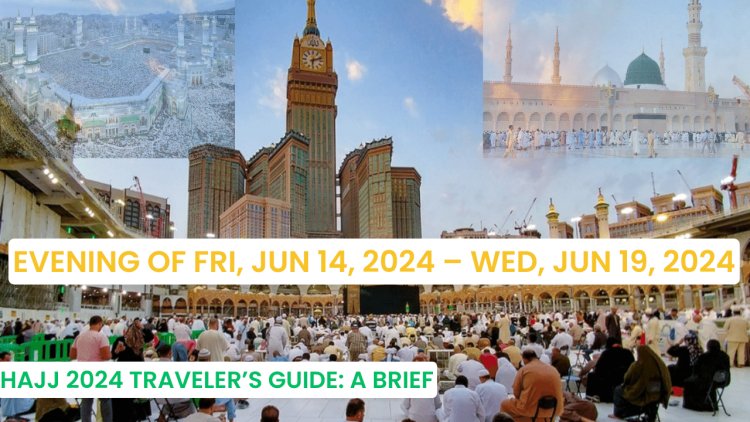Hajj 2024 Traveler’s Guide: A Brief
Discover essential health tips and detailed guidance for Hajj 2024, the annual Islamic pilgrimage, including insights on the pilgrimage rituals, health considerations, and navigating Hajj during Covid-19.

Discover essential health tips and detailed guidance for Hajj 2024, the annual Islamic pilgrimage, including insights on the pilgrimage rituals, health considerations, and navigating Hajj during Covid-19. This comprehensive guide is a must-read for Muslim travelers and pilgrims preparing for their journey to Mecca, offering valuable insights into ensuring a safe Hajj 2024.
Introduction
Hajj, the annual Islamic pilgrimage to Mecca, holds immense spiritual significance for Muslims worldwide. This sacred journey is one of the Five Pillars of Islam, representing one of the most profound expressions of faith and devotion. For Hajj 2024, the pilgrimage is set to commence from the evening of Friday, June 14th, and conclude on the evening of Wednesday, June 19th, pending the sighting of the moon of Dhul Hijjah, the 12th month of the Islamic calendar.
As we approach these dates, it’s crucial to consider both the spiritual and practical aspects of the journey. Health considerations are paramount to ensure a safe and fulfilling experience. This guide provides an extensive overview of Hajj rituals, essential preparatory steps, health tips, and the latest travel updates for navigating Hajj during the Covid-19 pandemic.
Hajj Rituals in 2024
The Hajj pilgrimage consists of several key rituals, each carrying deep spiritual significance. Understanding these rituals is essential for ensuring a meaningful journey.
Ihram

Ihram marks the beginning of Hajj. Pilgrims enter a state of consecration by donning special white garments that symbolize purity and equality before Allah. Men wear two white seamless cloths, while women wear modest clothing that meets Islamic standards. During Ihram, pilgrims must adhere to specific prohibitions, including refraining from cutting hair and nails, using scented products, and engaging in marital relations.
Tawaf

Tawaf involves circumambulating the Kaaba in Mecca seven times in a counterclockwise direction. This act symbolizes unity and devotion to Allah. Pilgrims express their submission and seek closeness to God through this ritual, which is performed at the beginning and end of Hajj.
Arafat Day

Evening of Fri, Jun 14, 2024 – Sat, Jun 15, 2024
Arafat Day is the pinnacle of Hajj, where pilgrims gather at Mount Arafat to stand in prayer and supplication from noon until sunset. This ritual, known as Wuquf, is a time for seeking forgiveness and reflecting on one's life. It commemorates the final sermon of Prophet Muhammad (PBUH) and is considered the most important day of Hajj.
Stoning of the Devil

The symbolic stoning of the devil takes place in Mina, where pilgrims cast stones at three pillars representing the rejection of evil and temptation. This ritual, known as Rami al-Jamarat, commemorates Prophet Ibrahim's (AS) defiance of Satan. Pilgrims collect pebbles and throw them at the pillars over three days.
Eid al-Adha

Evening of Sat, Jun 15, 2024 – Wed, Jun 19, 2024
Eid al-Adha, also known as the Festival of Sacrifice, marks the culmination of Hajj. Pilgrims sacrifice an animal, usually a sheep, goat, or cow, to commemorate Prophet Ibrahim's (AS) willingness to sacrifice his son in obedience to Allah. The meat is distributed among family, friends, and the needy, symbolizing charity and community.
Preparing for Hajj 2024
Preparing for Hajj involves more than just packing and logistics. It requires physical, mental, and spiritual readiness to undertake this significant journey.
Health Considerations
Vaccinations
- Mandatory Vaccines: Certain vaccinations may be mandatory for entry into Saudi Arabia. Pilgrims should refer to official guidelines for the latest requirements.
- Meningitis Vaccine: The Saudi government often requires proof of meningitis vaccination for Hajj pilgrims to prevent outbreaks during the pilgrimage.
Health Precautions
- Heat and Hydration: Mecca experiences high temperatures in June. Pilgrims should stay hydrated, use sun protection, and plan activities during cooler hours to avoid heat-related illnesses.
- Footwear and Hygiene: Comfortable and sturdy footwear is essential due to the extensive walking involved. Maintaining good hygiene practices, such as frequent handwashing and the use of hand sanitizers, helps prevent the spread of diseases.
Infectious Diseases
- Respiratory Hygiene: Given the crowded conditions, practicing respiratory hygiene is crucial. Wearing masks and avoiding close contact with individuals showing symptoms of illness can reduce the risk of respiratory infections.
- MERS Concerns: Middle East Respiratory Syndrome (MERS) has been a concern in the region. Pilgrims should follow guidelines to minimize the risk of infection, such as avoiding contact with camels and practicing good respiratory hygiene.
Essential Items to Pack
- Clothing: Lightweight, breathable clothing suitable for the hot climate. Include Ihram garments and modest attire for women.
- Health and Safety: A first aid kit, medications, sunblock, hand sanitizers, and masks.
- Travel Essentials: Passport, visa, travel documents, and copies of important identification.
- Comfort Items: Comfortable footwear, reusable water bottles, portable chargers, and a small backpack for daily necessities.
Physical Preparation
Undertaking Hajj requires physical stamina. Pilgrims should engage in regular exercise, such as walking and cardio, to build endurance. Additionally, understanding the significance of Hajj rituals and reflecting on their spiritual implications can enhance the overall experience.
Navigating Hajj During Covid-19
The Covid-19 pandemic has introduced new challenges for Hajj pilgrims. Staying informed about travel restrictions and health guidelines is crucial for a safe pilgrimage.
Travel Restrictions and Health Guidelines
Pilgrims should regularly check official sources for updates on travel restrictions and health protocols. The Saudi Ministry of Hajj and Umrah provides the latest information on entry requirements, quarantine measures, and safety guidelines.
Adhering to Safety Measures
To ensure a safe Hajj experience, pilgrims must adhere to recommended safety measures, including:
- Vaccination Requirements: Ensure compliance with Covid-19 vaccination mandates.
- Mask Wearing: Wear masks in crowded areas and during rituals.
- Social Distancing: Maintain physical distance wherever possible.
- Hygiene Practices: Frequently wash hands and use hand sanitizers.
Conclusion
Hajj is a profound spiritual journey that holds immense significance within the Islamic faith. As you prepare for Hajj 2024, prioritize your health, safety, and spiritual fulfillment. By understanding the rituals, making necessary preparations, and adhering to health guidelines, you can ensure a safe and spiritually enriching pilgrimage.
We encourage all pilgrims to share their Hajj experiences and advice for future travelers in the comments below. Your insights can inspire and guide others on their journey to Mecca.
May your Hajj be blessed and may you find peace and fulfillment in this sacred pilgrimage.
By following these guidelines and preparing thoroughly, you can embark on a transformative journey that strengthens your faith and brings you closer to Allah. Safe travels and Hajj Mubarak!
What's Your Reaction?




















